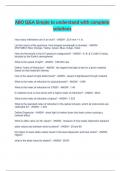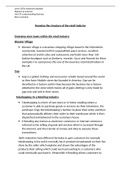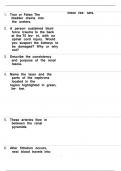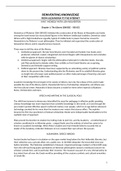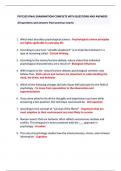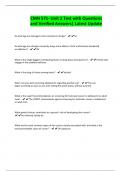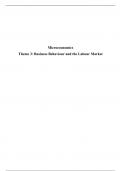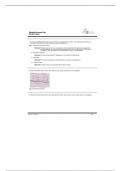Life Stages
Infancy 0-3:
★ PHYSICAL - At the age of 0-2 the baby can get into the sitting position
without help. This uses the big muscles to help sit up.
➔ Rolling over - Babies need help trying to roll over. They shouldn’t be able
to roll over when they're only born because it is very dangerous due to the
lack of strength and support in their head. Due to this, the baby should be
trying to roll over within the 5-6 month stage. Parents can help encourage
their baby to roll over by using toys.
➔ Sitting up - Babies need support within the first few months of
development. Parents normally use seats to help strengthen the muscles
in the baby's back. A baby should be able to sit up and support themselves
within the first 6 months of birth. This is not the precise time as some
babies will develop faster or slower than others.
★ INTELLECTUAL - At the age of 2 the baby will be learning new things to
get the mind going. This will involve things such as trying to find a toy that the
parent has hidden. By this point the child will also try to use different words to try
and communicate rather than just noises.
➔ Around 1-2 months, the first thing a baby will learn to do is smile which is
major for babies as it is a way of communicating.
➔ From 2-3 months, babies will often stare at the person who is talking as
they try to locate where the sound is coming from.
★ EMOTIONAL - At this point, the child should start to be building bonds with
the people who care for them. They will particularly gain a strong connection with
their parents/guardians. This will help create a sense of security and to also help
them throughout their life stages. By the age of 2 the infant will learn to deal with
a range of emotions such as feeling guilty or positive about situations. This is a
way of the infant dealing with a range of emotions. Tantrums will be thrown when
they cannot get their own way but the best way to deal with that will be to give
them space and talk about it with them and teach them how to deal with it.
★ SOCIAL - At this age they will be learning how to play with other children and
learning new names and faces. This will be the opportunity where it is best to
help teach the infant to share things such as toys. In the first few years of life,
infants are exposed to different family members, these are the people whom the
baby will be learning from. Anything the baby will see a family member do, they
will attempt to copy them. An infant will start with solitary play which is playing
by themselves in their own company and slowly they will progress into parallel
play which is playing alongside others but not actually sharing/playing with them.
, Life Stages
Early Childhood 3-8
★ PHYSICAL - The physical appearance of a child starts to change as they lose their
baby shape and begin to look more of a young adult. The infant's fast growth rate slows
down during childhood and their balance becomes better; this means that they can climb
and run without a fear of falling. At the age of 4 a child should be able to have accuracy in
small movements this means that they will be able to make things out of clay, walk
backwards and walk down the stairs with more confidence. From the age of 5-6 children
should be able to draw numbers, cut with scissors, dress themselves and ride a bike. They
should also be able to use a knife and fork and often tie their shoelaces sometimes with a
little help. From 7-10, children’s baby teeth will be lost so they can make way for their adult
teeth. Girls and boys both have similar body shapes until they start to hit puberty. Some
children may go through puberty at the age of 10 however, if they hit it later or earlier that
all depends on the child’s hormones which is completely normal.
★ INTELLECTUAL - Children are interested in everything at this age and they start to
ask questions about things and objects. This is so that they can develop the knowledge they
need to understand what objects are and what they need to do. As a child intellect starts to
develop early and they will be given books, puzzles and games to try to help their intellect
develop. A child will be sent home from school most days with either homework or a book to
read. The homework will only be simple such as sums, drawing a picture or even labelling a
picture, however, this will all contribute to help develop the child's intellect. The child will
learn to keep friendships, table manners and learn his/her name and know who to respond
to when they’re talking. A child will also learn how to do certain activities by watching others
which will teach them to be able to understand the concept of how to do activities.
★ EMOTIONAL - Children will learn to cope with their emotions and feelings by playing
with other children; some of the emotions they may go through are jealousy, anger,
happiness, love, fear, worry and guilt. Children are likely to have temper tantrums due to
them not knowing how to deal with their emotions. To deal with this you would need to sit
the child down and talk to them about their emotions and why they feel that way and try to
calm them down and reassure them that they will be ok so that they won’t feel confused.
★ SOCIAL - Developing good relationships with others is a skill that most children learn
from birth and start to develop when they start going to nursery. In nursery children learn to
talk to people from other races, genders and other religions. By children interacting with
others who have different backgrounds, this allows them to notice that everyone is equal.
Some children are good at developing relationships and others try to avoid having to
communicate. This may be because they are lacking in social skills. During childhood is when
a child learns to develop relationships between others and learns the importance of keeping
that relationship. A child learns how to make relationships work in the house, school and
extracurricular activities. Play is also important to form friendships, if two children like a
certain toy then they will both have something to talk about then they may find something
else they have in common. Play helps the child to develop practical things and to have the
ability to do things. Children learn to play cooperatively; this means that they learn to play
with others instead of playing alone.
Infancy 0-3:
★ PHYSICAL - At the age of 0-2 the baby can get into the sitting position
without help. This uses the big muscles to help sit up.
➔ Rolling over - Babies need help trying to roll over. They shouldn’t be able
to roll over when they're only born because it is very dangerous due to the
lack of strength and support in their head. Due to this, the baby should be
trying to roll over within the 5-6 month stage. Parents can help encourage
their baby to roll over by using toys.
➔ Sitting up - Babies need support within the first few months of
development. Parents normally use seats to help strengthen the muscles
in the baby's back. A baby should be able to sit up and support themselves
within the first 6 months of birth. This is not the precise time as some
babies will develop faster or slower than others.
★ INTELLECTUAL - At the age of 2 the baby will be learning new things to
get the mind going. This will involve things such as trying to find a toy that the
parent has hidden. By this point the child will also try to use different words to try
and communicate rather than just noises.
➔ Around 1-2 months, the first thing a baby will learn to do is smile which is
major for babies as it is a way of communicating.
➔ From 2-3 months, babies will often stare at the person who is talking as
they try to locate where the sound is coming from.
★ EMOTIONAL - At this point, the child should start to be building bonds with
the people who care for them. They will particularly gain a strong connection with
their parents/guardians. This will help create a sense of security and to also help
them throughout their life stages. By the age of 2 the infant will learn to deal with
a range of emotions such as feeling guilty or positive about situations. This is a
way of the infant dealing with a range of emotions. Tantrums will be thrown when
they cannot get their own way but the best way to deal with that will be to give
them space and talk about it with them and teach them how to deal with it.
★ SOCIAL - At this age they will be learning how to play with other children and
learning new names and faces. This will be the opportunity where it is best to
help teach the infant to share things such as toys. In the first few years of life,
infants are exposed to different family members, these are the people whom the
baby will be learning from. Anything the baby will see a family member do, they
will attempt to copy them. An infant will start with solitary play which is playing
by themselves in their own company and slowly they will progress into parallel
play which is playing alongside others but not actually sharing/playing with them.
, Life Stages
Early Childhood 3-8
★ PHYSICAL - The physical appearance of a child starts to change as they lose their
baby shape and begin to look more of a young adult. The infant's fast growth rate slows
down during childhood and their balance becomes better; this means that they can climb
and run without a fear of falling. At the age of 4 a child should be able to have accuracy in
small movements this means that they will be able to make things out of clay, walk
backwards and walk down the stairs with more confidence. From the age of 5-6 children
should be able to draw numbers, cut with scissors, dress themselves and ride a bike. They
should also be able to use a knife and fork and often tie their shoelaces sometimes with a
little help. From 7-10, children’s baby teeth will be lost so they can make way for their adult
teeth. Girls and boys both have similar body shapes until they start to hit puberty. Some
children may go through puberty at the age of 10 however, if they hit it later or earlier that
all depends on the child’s hormones which is completely normal.
★ INTELLECTUAL - Children are interested in everything at this age and they start to
ask questions about things and objects. This is so that they can develop the knowledge they
need to understand what objects are and what they need to do. As a child intellect starts to
develop early and they will be given books, puzzles and games to try to help their intellect
develop. A child will be sent home from school most days with either homework or a book to
read. The homework will only be simple such as sums, drawing a picture or even labelling a
picture, however, this will all contribute to help develop the child's intellect. The child will
learn to keep friendships, table manners and learn his/her name and know who to respond
to when they’re talking. A child will also learn how to do certain activities by watching others
which will teach them to be able to understand the concept of how to do activities.
★ EMOTIONAL - Children will learn to cope with their emotions and feelings by playing
with other children; some of the emotions they may go through are jealousy, anger,
happiness, love, fear, worry and guilt. Children are likely to have temper tantrums due to
them not knowing how to deal with their emotions. To deal with this you would need to sit
the child down and talk to them about their emotions and why they feel that way and try to
calm them down and reassure them that they will be ok so that they won’t feel confused.
★ SOCIAL - Developing good relationships with others is a skill that most children learn
from birth and start to develop when they start going to nursery. In nursery children learn to
talk to people from other races, genders and other religions. By children interacting with
others who have different backgrounds, this allows them to notice that everyone is equal.
Some children are good at developing relationships and others try to avoid having to
communicate. This may be because they are lacking in social skills. During childhood is when
a child learns to develop relationships between others and learns the importance of keeping
that relationship. A child learns how to make relationships work in the house, school and
extracurricular activities. Play is also important to form friendships, if two children like a
certain toy then they will both have something to talk about then they may find something
else they have in common. Play helps the child to develop practical things and to have the
ability to do things. Children learn to play cooperatively; this means that they learn to play
with others instead of playing alone.

